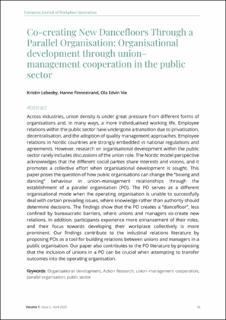Co-creating New Dancefloors Through a Parallel Organisation: Organisational development through union- management cooperation in the public sector
Peer reviewed, Journal article
Published version
Permanent lenke
https://hdl.handle.net/11250/3062660Utgivelsesdato
2023Metadata
Vis full innførselSamlinger
Sammendrag
Across industries, union density is under great pressure from different forms of organisations and, in many ways, a more individualised working life. Employee relations within the public sector have undergone a transition due to privatisation, decentralisation, and the adoption of quality management approaches. Employee relations in Nordic countries are strongly embedded in national regulations and agreements. However, research on workplace development within the public sector rarely includes discussions of the union role. The Nordic model perspective acknowledges that the different social parties share interests and visions, and it promotes a collective effort when workplace development is sought. This paper poses the question of how public organisations can change the “boxing and dancing” behaviour in union–management relationships through the establishment of a parallel organisation (PO). The PO serves as a different organisational mode when the operating organisation is unable to successfully deal with certain prevailing issues, where knowledge rather than authority should determine decisions. The findings show that the PO creates a “dancefloor”, less confined by bureaucratic barriers, where unions and managers co-create new relations. In addition, participants experience more enhancement of their roles, and their focus towards developing their workplace collectively is more prominent. Our findings contribute to the industrial relations literature by proposing POs as a tool for building relations between unions and managers in a public organisation. Our paper also contributes to the PO literature by proposing that the inclusion of unions in a PO can be crucial when attempting to transfer outcomes into the operating organisation.

